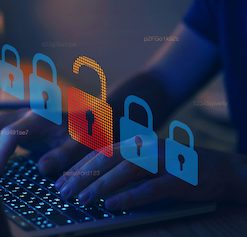What happens when your livelihood is at stake, thanks to someone stealing your identity or draining your account? The real-life possibilities are nerve-wracking, to say the least. The constant barrage of cyberthreats we face as consumers today is exhausting. Just this month, two major situations were revealed. A Florida marketing firm, Exactis, had their database on a publicly accessible server. The information exposed ranged from phone numbers, home, and email addresses to the number, age, and gender of a customer’s children. As of now, social security numbers and credit card data have not been leaked. However, what makes this breach particularly anxiety-inducing is that now cybercriminals have the ability to improve the success rate of socially engineered attacks. For example, phishing attacks could become rampant through social media and email.
To add insult to injury, last week, researchers found a way to discover everything you type and read on your phone simply by studying the differing power levels of a smart battery. By implanting a micro-controller into a phone’s battery, they could record the power flowing in and out of the device. Then, with the use of AI, power flows were matched with specific keystrokes. Using this technique, the researchers proved that cybercriminals could record passwords, monitor website activity, access call records, and know the last time the camera was used. Smart batteries are attractive targets because they are not as secure as your phone. In fact, they expose all personal data. While the possibilities are stressful, the good news is that this attack remains theoretical.
The seemingly endless string of security events and the stress they cause can take a serious toll on our well-being. While we can’t prevent breaches from occurring, it’s important to remember that we can be prepared to take the right steps to minimize any damage when one hits. Whether we’re dealing with the repercussions of a data breach, or adapting to new vulnerabilities, developing positive security habits can help improve and maintain your digital health. Taking care of your mobile devices to ensure they remain secure – and therefore optimally functional – is like taking care of your own well-being; to maintain cybersecurity health, you have to perform basic upkeep.
Tips to Protect Agains Data Breach
To help you prepare in advance for the next data breach and ensure your device remains in good cybersecurity health, here are some habits you should consider picking up, stat:
- Be aware of your surroundings. Mindfulness is a habit that can be developed, provides almost instant results, can support longevity, general awareness and well-being. We can learn a lot from mindfulness when it comes to cybersecurity. By taking a little bit of time to be aware of our surroundings, we can prevent vulnerabilities and potential threats simply by paying attention.
- Set up alerts. Just like going to a doctor regularly for check-ups, you should “check-up” on your accounts. Not all data breaches expose financial data, but personal data that is leaked can still be used to access your financial accounts. Talk with your bank or financial planner about setting up a fraud alert on your cards to maintain control of your accounts.
- Stay away from untrustworthy emails or messages. The mantra “no bad vibes” is surprisingly full of wisdom. Ridding your life of energy suckers and toxic people supports health – and the same goes for malicious messages. If you see a suspect item from an unknown source in your inbox or via a direct message or comment on social media, do not click on the message. If you do open it, be sure not to click on any links. To be safe, delete the email or message altogether.
- Avoid public Wi-Fi when possible. Just as sleep is a panacea of sorts that helps to fight off bugs, giving your phone a break from public Wi-Fi is one of the best things you can do to ensure your cybersafety. The use of public Wi-Fi can offer cybercriminals a backdoor into your phone. By spoofing a legitimate website, they can gain access to your sensitive information. Give your device a much-needed break until you can use Wi-Fi you trust, you’ll save yourself a serious headache.
- Switch up your passwords. It’s been said that variety is the spice of life, the secret to a happy relationship, and a way to stay engaged and aware in old age. The same is true when it comes to your passwords. When you mix it up, you keep cybercriminals guessing. Passwords are your data’s first defense against cybercriminals. Be sure to change them every so often and never use “1234” or “password.” If remembering a difficult password or remembering a multitude of them is hard, consider using a password manager.
- Consider investing in identity theft protection. Vitamins are excellent supplements to a healthy diet, adding in additional nutrition when and where you need it — but not meant to be taken as the sole way to maintain health. Identity theft protection can be a supplement of sorts to your already positive security habits. With McAfee Identity Theft Protection, users can take proactive steps toward protecting their identities with personal and financial monitoring and recovery tools.
The power of habit actually dictates 40% of our day. As with your body and mind, the more you create healthy, positive habits, the easier it is to maintain health. The same is true for your security “health.” The more you express safe habits, the easier it will become and the safer you will be – both in the short and long term.
Interested in learning more about IoT and mobile security tips and trends? Stop by ProtectWhatMatters.online, and follow @McAfee_Home on Twitter, and ‘Like” us on Facebook.














